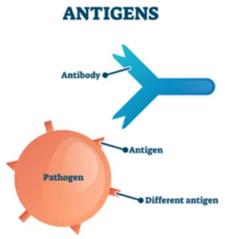The design and preparation of antigens is critical to prepare antibodies using hybridoma technology, as it determins whether antibodies can be obtained eventually. Therefore, it is essential to determine the hybridoma antigen preparation process before beginning hybridoma antibody preparation.

An antigenic determinant or epitope is a special chemical group on the surface of an antigen molecule that determines the antigen's specificity. It is the region where an antigen interacts with an antibody. A typical antigenic determinant contains 6–8 amino acid residues, and there is only one antigenic determinant every 5–10kD. It is therefore difficult for a polypeptide or protein with an excessively small molecule to contain an antigenic determinant.
In early stages of human development, the immune system develops tolerance to the body's own substances. Therefore, for a substance to elicit an immune response, it cannot be identical or even similar to a substance already present in the body. (Exogenous ingredients need not be considered if they are obtained through immune pardons, such as the brain, eyeballs, and internal components of the testes.)
Immunogenicity is not exhibited by substances with simple, repetitive structures. Taking gelatin as an example, gelatin has high molecular weight and strong exogenous strength, but most of its amino acids are linear chain amino acids which are easily degraded in vivo, so its immunogenicity is quite low. Similarly, starch, nucleic acid, and polylysine are also weakly immunogenic.
The antigen must be degradable. D-amino acids, for instance, are composed of substances with very low immunogenicity, as the body cannot degrade D-amino acid-based proteins or peptides.
Natural proteins are good antigens because of their modifications and complex structures. However, due to the extremely low purity of the native protein, subsequent immunization and purification are not possible. The purified native protein is therefore an excellent antigen.
Compared to natural proteins, recombinant proteins are easier to obtain higher purity, and their identification and production processes are more manageable and straightforward. However, recombinant proteins are hard to modify and have complicated structures, limiting their applications.
The extremely high similarity of family proteins result in the difficulties to generate suitable antibodies. The optimal solution is to synthesize different regions of these proteins as immunogens. If the synthesized peptide is small, it is necessary to attach a large carrier, such as bovine serum albumin, rabbit serum albumin, human serum albumin, and ovalbumin to increase its immunogenicity.
They are predominantly small molecule drugs with an average molecular weight between 300 and 1,000Da. Small molecules with aromatic rings are more likely to elicit immune responses. Small molecule drugs are haptens and need to be conjugated with vectors for animal immunization.
When preparing antibodies against tumor-specific antigens, it is generally necessary to use tissues, whole cells, or cellular components as antigens to select appropriate immunization strategies for animal immunization. In general, the purer the antigen, the smaller the nonspecific immune response and the greater the proportion of target antibody in the antiserum. If tissue is used as an antigen, it must be broken down into individual cells using a filter and pestle. Because of their stronger granularity and exogenous nature, it is recommended to retain intact cells when whole cells are used as antigens. If the cell component is used as an antigen, the appropriate separation method should be selected according to the different components.
Creative Biolabs is willing to share additional hybridoma-related expertise and knowledge with you to help your research run smoothly. At the same time, we have a perfect hybridoma platform for you to solve difficult problems in the development of hybridoma antibodies.
All listed services and products are For Research Use Only. Do Not use in any diagnostic or therapeutic applications.